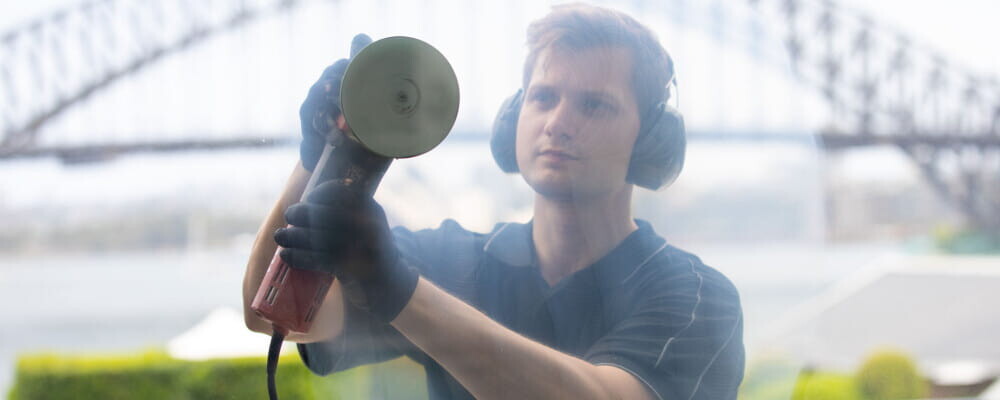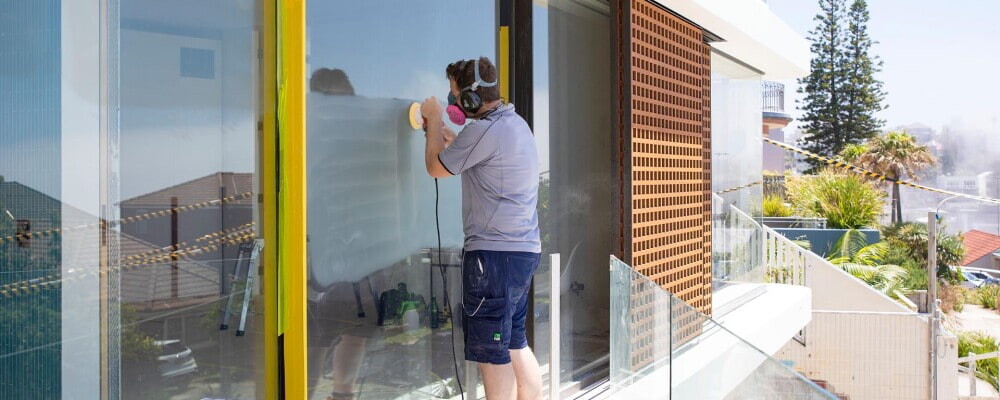


How can glass hard water stains be prevented and/or removed?

How can glass staining be prevented?
The Australian Glass & Glazing Association recommends the following to reduce the risk of staining:
Shower screens - Squeegee or chamois down the glass after every use and clean regularly.
Windows & doors - Ensure hoses or garden sprinkler systems are not directed onto the glass.
Glass balustrades - Ensure hoses or garden sprinkler systems are not directed onto the glass.
Glass pool fences - Endeavour to reduce the amount of splashing from the pool onto the glass. Rinse or clean regularly.
Glass tabletops – Do not allow water to pond on glass furniture. To keep your glass in pristine condition glass should be cleaned regularly.
For the full article, check this link. This resource does not cover problems in relation to staining on construction sites
What about building sites? - High-rise curtain walls are particularly susceptible to staining due to the lapse of time between glass installation and first clean and due to the presence of alkali in concrete and mortar. The risk of staining can be minimized by cleaning the glass as soon as practical and by preventing concrete runoff and other lime rich water to reach the glass.
Is there a more permanent solution? Yes, there is a very effective solution, but it is costly. It is called nano-coating.
Check this website for an in-depth explanation and a plug for their nano-coating at the end of the article. Just ignore the bit about staining not being removable. (They don't know about us)
How can glass staining be removed?
Glass staining or glass corrosion is quite varied in all kinds of situations as the factsheet quoted above shows. Even more varied are the solutions proposed and a multitude of websites, blogs and forums. We will briefly deal with some of them:
Lime juice, vinegar and other acidic mixtures
Yes, they may make the haziness visually disappear and thus provide a temporary solution. Unfortunately, what you cannot see is that acids also further eat into the microscopic cavities that have been caused by the prior staining, making the whole thing worse when it reappears. If you don't trust us, read this article by Max Richens, a glass engineer, particularly the section on "culinary acids"
Cream cleansers, "Jiffy" etc
Yes they are a possibility, but they will also roughen up the glass, increasing the risk of a more severe return of the problem as stated above
Commercial glass stain removal compounds
There are quite a few on the market Most of them are also acid based, sometimes including a buffer that is designed to prevent damage to surround surfaces. Some are also in powder form combining the chemical reaction with an abrasive. Once again, we do not recommend using any acid-based compounds to remove glass staining, not matter how widespread they may be.
Glass polishing with cerium oxide or abrasives
This is clearly the gold standard in glass stain removal. It is a mechanical process, not a chemical one. It is free of acid and it removes the corroded, porous layer of glass altogether. Some of the manufacturers of chemicals will say it cannot be done, but we have repaired many thousands of panels like that, even where treatments with chemicals were unsuccessful. (See here)
